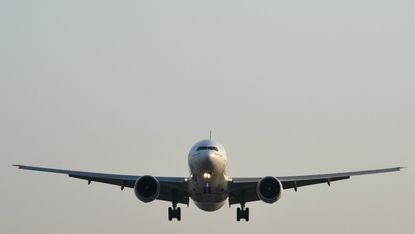How much would a carbon charge add to flight ticket prices?
Ministers considering adding a levy to airline tickets to tackle emissions

Air passengers could have a carbon charge added to the price of tickets automatically under new government plans.
In a bid to cut greenhouse gas emissions, ministers are considering measures that would ask all airlines to introduce carbon offsetting payments at the point of ticket sale.
Passengers could choose to pay more for tickets, with the extra used to offset greenhouse gas emissions. Or the payments could work on an “opt-out” system, which similar measures also be applied to trains, buses and ferries.
Subscribe to The Week
Escape your echo chamber. Get the facts behind the news, plus analysis from multiple perspectives.

Sign up for The Week's Free Newsletters
From our morning news briefing to a weekly Good News Newsletter, get the best of The Week delivered directly to your inbox.
From our morning news briefing to a weekly Good News Newsletter, get the best of The Week delivered directly to your inbox.
The Times calculates that a flight between London and New York could increase by just under £30, falling to £15 when travelling with the most fuel-efficient airlines. A journey between London and Madrid could rise by an estimated £5.
The Guardian says ministers hope the new plans will “raise awareness about the effects of public transport on the environment” but the Daily Mail points out that the plan could be unpopular, as it comes as “Air Passenger Duty - which is paid by all passengers flying out of the UK, continues to rise - with rates set to increase again from April next year”.
The government said it was hoped that the carbon charge move would “drive consumer choices towards less polluting journey options”. A public “call for evidence” runs until the end of September.
Transport accounted for about a third of Britain’s CO2 emissions in 2018. However, a recent study found that only half of airlines give passengers the opportunity to offset CO2.
Transport Secretary Chris Grayling said: “An offsetting scheme could help inform travellers about how much carbon their journey produces and provide the opportunity to fund schemes, like tree planting, to compensate for those emissions.”
Tim Aldersdale, chief executive of Airlines UK, said: “UK airlines are committed to decarbonising aviation and are working with government to continue progress through the introduction of new greener technologies, including more efficient aircraft and engines, sustainable aviation fuels and vital airspace modernisation.”
Create an account with the same email registered to your subscription to unlock access.
Sign up for Today's Best Articles in your inbox
A free daily email with the biggest news stories of the day – and the best features from TheWeek.com
-
 'Making a police state out of the liberal university'
'Making a police state out of the liberal university'Instant Opinion Opinion, comment and editorials of the day
By Harold Maass, The Week US Published
-
 8 looming climate tipping points that imperil our planet
8 looming climate tipping points that imperil our planetThe Explainer New reports detail the thresholds we may be close to crossing
By Devika Rao, The Week US Published
-
 Try 6 free issues of The Week Junior
Try 6 free issues of The Week JuniorSpark your child's curiosity with The Week Junior - the award-winning current affairs magazine for 8-14s.
By The Week Published
-
 8 looming climate tipping points that imperil our planet
8 looming climate tipping points that imperil our planetThe Explainer New reports detail the thresholds we may be close to crossing
By Devika Rao, The Week US Published
-
 Costa Rica's renewable energy success could be under threat
Costa Rica's renewable energy success could be under threatUnder the radar Central American nation generates nearly all its electricity from renewable sources but climate change is bringing huge challenges
By Harriet Marsden, The Week UK Published
-
 What is cloud seeding and did it cause Dubai's severe rainfall?
What is cloud seeding and did it cause Dubai's severe rainfall?The Explainer The future is flooded
By Devika Rao, The Week US Published
-
 Ottawa climate talks: can global plastic problem be solved?
Ottawa climate talks: can global plastic problem be solved?In the spotlight Nations aim to draft world's first treaty on plastic pollution, but resistance from oil- and gas-producing countries could limit scope
By Harriet Marsden, The Week UK Published
-
 What is rock flour and how can it help to fight climate change?
What is rock flour and how can it help to fight climate change?The Explainer Glacier dust to the rescue
By Devika Rao, The Week US Published
-
 Arid Gulf states hit with year's worth of rain
Arid Gulf states hit with year's worth of rainSpeed Read The historic flooding in Dubai is tied to climate change
By Peter Weber, The Week US Published
-
 The growing thirst for camel milk
The growing thirst for camel milkUnder the radar Climate change and health-conscious consumers are pushing demand for nutrient-rich product – and the growth of industrialised farming
By Harriet Marsden, The Week UK Published
-
 Why curbing methane emissions is tricky in fight against climate change
Why curbing methane emissions is tricky in fight against climate changeThe Explainer Tackling the second most significant contributor to global warming could have an immediate impact
By Richard Windsor, The Week UK Published